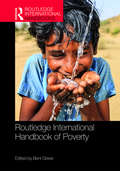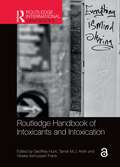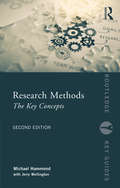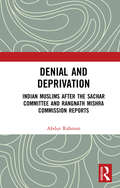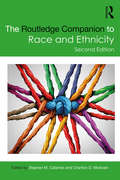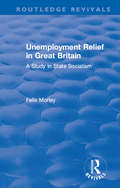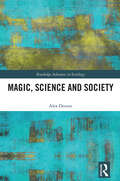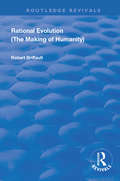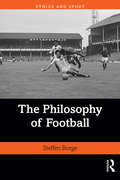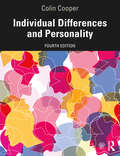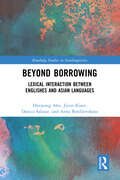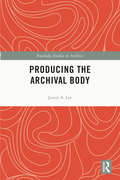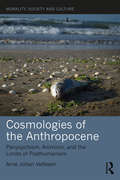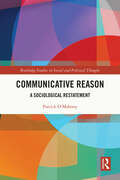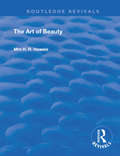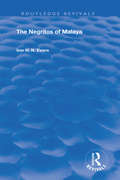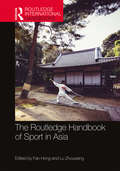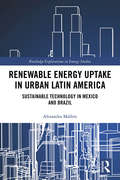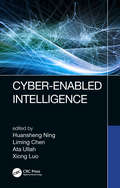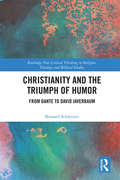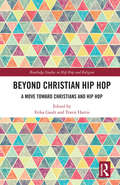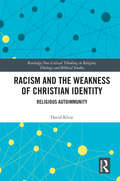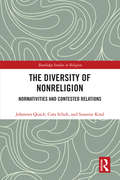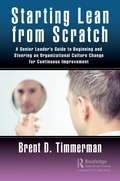- Table View
- List View
Routledge International Handbook of Poverty (Routledge International Handbooks)
by Bent GreveThe first of the UN Millennium Goals was to reduce extreme poverty and in 2014 it was halved compared to 1990, and now the goal is to eradicate poverty and hunger by 2030. The reduction in poverty is, to a high degree, the consequence of the rapid economic development in a few countries, especially China, but in many countries around the globe poverty is still at a high level and is influencing societies’ overall development. It is against this background that this Handbook provides an up-to-date analysis and overview of the topic from a large variety of theoretical and methodological angles. Organised into four parts, the Handbook provides knowledge on what poverty is, how it has developed, and what type of policies might be able to succeed in reducing poverty. Part I investigates conceptual issues and relates concepts to people’s relative position in society and the understanding of justice. Part II shows how poverty has developed. It combines existing empirical knowledge with regional/national understandings of the issue of poverty. Part III analyses policies and interventions with the aim of reducing or alleviating poverty within a national as well as global context. It includes a variety of countries and examples. Finally, Part IV tells us what can be done about poverty; what instruments are available to end poverty as we know it today. This volume will be an invaluable reference book for students and scholars throughout the social sciences, particularly in sociology, social policy, public policy, development studies, international relations and politics.
Routledge Handbook of Intoxicants and Intoxication (Routledge International Handbooks)
by Geoffrey Hunt Vibeke Asmussen Frank Tamar M.J. AntinBringing together scholars from different disciplines in the humanities and social sciences, this multidisciplinary Handbook offers a comprehensive critical overview of intoxicants and intoxication. The Handbook is divided into 34 chapters across eight thematic sections covering a wide range of issues, including the meanings of intoxicants; the social life of intoxicants; intoxication settings; intoxication practices; alternative approaches to the study of intoxication; scapegoated intoxicants; discourses shaping intoxication; and changing notions of excess. It explores a range of different intoxicants, including alcohol, tobacco, coffee, tea, and legal and illicit drugs, including amphetamine, cannabis, ecstasy, khat, methadone, and opiates. Chapter length case studies explore these intoxicants in a variety of countries, including the USA, the UK, Australia, Bosnia & Herzegovina, Brazil, Denmark, Ireland, Japan, Kyrgyzstan, Nigeria, Singapore, and Sweden, across a broad timespan covering the nineteenth century to the present day. This wide-ranging Handbook will be of great interest to researchers, students, and instructors within the humanities and social sciences with an interest in a wide range of different intoxicants and different intoxication practices. Chapters 15 and 31 of this book are freely available as downloadable Open Access PDFs at http://www.taylorfrancis.com under a Creative Commons [Attribution-Non Commercial-No Derivatives (CC-BY-NC-ND)] 4.0 license.
Research Methods: The Key Concepts (Routledge Key Guides)
by Jerry Wellington Michael HammondThis book provides an overview of ninety key concepts which often trouble those who are new to researching within the social sciences. It covers theories of knowledge, methodologies and methods. Each entry offers a definition of a concept, shows how researchers have used that concept in their research and discusses difficulties that the concept presents. The book supports those undertaking their own social research projects by providing detailed critical commentary on key concepts in a particularly accessible way. In exploring these concepts, a wide range of research reports across many different fields are described. These include not only classic accounts, but also a broad selection of recent studies, some written by new researchers. The book will be useful for higher-education students carrying out projects within social science faculties at the end of their first degree or during a master's programme, though it will also be helpful for those undertaking doctoral research, and some entries have been written with the production of a thesis in mind. This second edition of Research Methods: The Key Concepts provides a more comprehensive and up-to-date coverage, as old entries have been updated and 19 new entries added. It helps new researchers to navigate the changing landscape of social research by recognising a) the changes in the ways researchers are thinking about knowledge and acquiring knowledge, b) the increasing use of digital tools to collect data, and c) the desire many contemporary researchers feel to promote social justice through their research.
Denial and Deprivation: Indian Muslims after the Sachar Committee and Rangnath Mishra Commission Reports
by Abdur RahmanThe volume attempts to gauge and analyse the level of denial and deprivation faced by Indian Muslims by evaluating their status after a gap of several years of Sachar Committee (2006) and Rangnath Mishra Commission (2007) Reports. It presents and discusses the current conditions with respect to outcome indicators such as population, education, economy, poverty, unemployment, consumption level, availability of bank loans, infrastructure and civic facilities and representation in government employment. By placing facts in perspective, it also discusses community-specific issues such as use of Urdu, madrasa education and Waqf.In the post-Sachar era, governments started many schemes to improve the condition of Muslims whose reach and impact is assessed with the help of latest data. It presents the social structure of Muslims, presence of OBCs and Dalits and suggests a practical pattern for reservation. It follows up the process of implementation of recommendations of these reports and highlights how the governments adopted tokenism, attempted to implement minor recommendations and shied away from major ones.The volume highlights the lopsided attitude of the previous UPA governments, hostile attitude of the present NDA regime and accelerated marginalization of Muslims in today’s scenario due to open discrimination, mob-violence, lynching and hate crimes in the name of various communal issues.Please note: Taylor & Francis does not sell or distribute the Hardback in India, Pakistan, Nepal, Bhutan, Bangladesh and Sri Lanka
The Routledge Companion to Race and Ethnicity (Routledge Companions)
by Stephen M. Caliendo Charlton D. McIlwainThe second edition of The Routledge Companion to Race and Ethnicity offers readers a broad overview of scholarly exploration of the ways that humans have organized themselves (and have been organized) according to racial and ethnic divisions. More than 80 scholars from around the world and representing multiple academic traditions contribute entries to this accessible yet sophisticated volume that addresses contemporary issues in historical context. The first half of the book challenges readers to grapple with some of the most controversial aspects of categorization, prejudice and discrimination through focused chapters ranging from the notion of Whiteness to the supposed biological rationale for racial categorization. The second half is comprised of 70 shorter entries on specialized concepts, persons and groups that are crucial to understanding these issues. Taken as a whole, this volume provides a broad, multi-disciplinary and global overview of issues that continue to provide challenges to notions of equality and justice.
Unemployment Relief in Great Britain: A Study in State Socialism (Routledge Revivals)
by Felix MorleyOriginally published in 1924, Unemployment Relief in Great Britain takes up the history of unemployment relief in Great Britain, focusing on the after effects of the post-war period and the Great Depression. Primarily, the book provides a detailed study of England’s experience with compulsory unemployment insurance and public employment exchanges. The book provides an intriguing study that will appeal to sociologists and historians alike, adeptly weaving practical aspects of the insurance acts, and the administration of employment exchanges.
Magic, Science and Society (Routledge Advances in Sociology)
by Alex DennisMagic, Science and Society investigates the way the ‘rationality debate’ has developed over the last century, from E.E. Evans-Pritchard’s study of Azande magic, through Peter Winch’s argument that there can be no such thing as a social science, across the arguments about the proper status of science in the 1970s and 1980s, to the ‘epistemological’ and ‘ontological’ turns of the early twenty-first century.Different people have different understandings of what is rational: some practise magic, some orientate to legal convention and tradition and others defer to science and logic. Starting with anthropological studies of witchcraft, and working through to contemporary debates about epistemology and ontology in social science, this book systematically examines the ways key questions about these issues have been framed and answered. These include: Can ‘magic’ be real, either for members of the cultures that practise it or more generally? How can we arbitrate between different types of rationality? Is science a benchmark for studying other forms of rationality or just a cultural practice like any other? What are the implications of these issues for the social sciences themselves? This book will be of interest to anthropologists, sociologists, philosophers of the social sciences and science studies practitioners.
Rational Evolution: The Making of Humanity (Routledge Revivals)
by Robert BriffaultPublished in 1919: The author discusses the development of Humanity from Evolution to Civilisation to the birth of Nations and European Liberations.
The Philosophy of Football (Ethics and Sport)
by Steffen BorgeHuman beings are the only creatures known to engage in sport. We are sporting animals, and our favourite pastime of football is the biggest sport spectacle on earth. The Philosophy of Football presents the first sustained, in-depth philosophical investigation of the phenomenon of football. In explaining the complex nature of football, the book draws on literature in sociology, history, psychology and beyond, offering real-life examples of footballing actions alongside illuminating thought experiments. The book is organized around four main themes considering the character, nature, analysis and aesthetics of football. It discusses football as an extra-ordinary, unnecessary, rule-based, competitive, skill-based physical activity, articulated as a social (as opposed to natural) kind that is fictional in character, and where fairness or fair play – contrary to much sport ethical discussion – is not centre stage. Football, it is argued, is a constructive- destructive contact sport and, in comparison to other sports, is lower scoring and more affected by chance. The latter presents to its spectators a more unpredictable game and a darker, more complex and denser drama to enjoy. The Philosophy of Football deepens our understanding of the familiar features of the game, offering novel interpretations on what football is, how and why we play it, and what the game offers its followers that makes us so eagerly await match day. This is essential reading for anybody with an interest in the world’s most popular game or in the philosophical or social study of sport.
Individual Differences and Personality
by Colin CooperIndividual Differences and Personality provides a student-friendly introduction to both classic and cutting-edge research into personality, mood, motivation and intelligence, and their applications in psychology and in fields such as health, education and sporting achievement. Including a new chapter on 'toxic' personality traits, and an additional chapter on applications in real-life settings, this fourth edition has been thoroughly updated and uniquely covers the necessary psychometric methodology needed to understand modern theories. It also develops deep processing and effective learning by encouraging a critical evaluation of both older and modern theories and methodologies, including the Dark Triad, emotional intelligence and psychopathy. Gardner’s and hierarchical theories of intelligence, and modern theories of mood and motivation are discussed and evaluated, and the processes which cause people to differ in personality and intelligence are explored in detail. Six chapters provide a non-mathematical grounding in psychometric principles, such as factor analysis, reliability, validity, bias, test-construction and test-use. With self-assessment questions, further reading and a companion website including student and instructor resources, this is the ideal resource for anyone taking modules on personality and individual differences.
Beyond Borrowing: Lexical Interaction between Englishes and Asian Languages (Routledge Studies in Sociolinguistics)
by Jieun Kiaer Anna Bordilovskaya Hyejeong Ahn Danica SalazarIn their book, the authors describe the usage of and attitudes towards English in Asia since the 19th century, as well as the creative and dynamic ways in which Asians of the 21st century continually reinvent the lexicon of English, and the lexicons of their native tongues. The current biggest source of loanwords for many of the world’s languages is English, the once obscure Germanic language that has risen to the role of a global lingua franca. However, the overwhelming influence of English is far from being entirely one-sided, at least from a lexical perspective. Many have decried the way that English has "invaded" the vocabularies of their languages, without realizing that the English word stock is to some extent also being invaded by these languages. This book explores the phenomenon of word exchange by examining its occurrence between English and some of the major languages spoken in Asia-highly multi-ethnic, multicultural, and multilingual region where English is the predominant medium of international and intraregional communication. Students and researchers from various linguistic areas such as World Englishes, applied linguistics, sociolinguistics, lexicology, and contact linguistics will find this book appealing.
Producing the Archival Body (Routledge Studies in Archives)
by Jamie A. LeeProducing the Archival Body draws on theoretical and practical research conducted within US and Canadian archives, along with critical and cultural theory, to examine the everyday lived experiences of archivists and records creators that are often overlooked during archival and media production. Expanding on the author’s previous work, which engaged archival and queer theories to develop the Queer/ed Archival Methodology that intervenes in traditional archival practices, the book invites readers interested in humanistic inquiry to re-consider how archives are defined, understood, deployed, and accessed to produce subjects. Arguing that archives and bodies are mutually constitutive and developing a keen focus on the body and embodiment alongside archival theory, the author introduces new understandings of archival bodies. Contributing to recent disciplinary moves that offer a more transdisciplinary emphasis, Lee interrogates how power circulates and is deployed in archival contexts in order to build critical understandings of how deeply archives influence and shape the production of knowledges and human subjectivities. Producing the Archival Body will be essential reading for academics and students engaged in the study of archival studies, library and information science, gender and women’s studies, anthropology, history, digital humanities, and media studies. It should also be of great interest to practitioners working in and with archives
Cosmologies of the Anthropocene: Panpsychism, Animism, and the Limits of Posthumanism (Morality, Society and Culture)
by Arne Johan VetlesenThis book engages with the classic philosophical question of mind and matter, seeking to show its altered meaning and acuteness in the era of the Anthropocene. Arguing that matter, and, more broadly, the natural world, has been misconceived since Descartes, it explores the devastating impact that this has had in practice in the West. As such, alternatives are needed, whether philosophical ones such as those offered by figures such as Whitehead and Nagel, or posthumanist ones such as those developed by Barad and Latour. Drawing on recent anthropological work ignored by philosophers and sociologists alike, the author considers a radical alternative cosmology: animism understood as panpsychism in practice. This understanding of mind and matter, of culture and nature, is then turned against present-day posthumanist critiques of what the Anthropocene amounts to, showing them up as philosophically misguided, politically mute, and ethically wanting. A ground-breaking reconceptualization of the natural world and our treatment of it, Cosmologies of the Anthropocene will appeal to scholars of sociology, social theory, philosophy and anthropology with interests in our understanding of and relationship with nature.
Communicative Reason: A Sociological Restatement (Routledge Studies in Social and Political Thought)
by Patrick O'MahonyThe book examines philosophical and sociological approaches within critical theory and more widely from the vantage point of communicative reason. It seeks to revitalize the sociological dimension of critical theory by advancing a critical sociology of reason. It does so fully in the knowledge that reason is a contentious concept in sociology and other disciplines. Nonetheless, building on Habermas’s original insight, it argues that an extensively modified version of communicative reason is indispensable. This modified approach will draw extensively from Peirce’s pragmatist semiotics and critical cognitive sociology. Such a focus has significant implications for meta-theoretical, theoretical-empirical, and methodological approaches in critical theory, critical sociology, and related disciplines. This book will be of interest to readers in the social sciences, humanities, and philosophy who value the importance of a social theory of a reasonable society for their disciplines and for increasingly essential interdisciplinary activities. The book will also appeal to many in critical theory and beyond who are interested in the cognitive foundations of normative orders, including unjust or pathological as well as actually or potentially just foundations. The book emphasizes both validity and critique within communicative reason and critical theory and accordingly presents a distinctive perspective on critical-reconstructive research.
The Art of Beauty (Routledge Revivals)
by H. R. HaweisThis book was originaly published in 1878. The Culture of beauty is everywhere a legitimate art. But the beauty and adornment of the human form, the culture of personal beauty, is of the first interest and importance. This book explores the art of beauty, including chapters on the pleasure of beauty, the importance of dress, and the moralities of dress.
The Negritos of Malaya (Routledge Revivals)
by Ivor H. EvansPublished in 1937. This book, written by the well-known authority on the ethnology and archaeology of the Malay Peninsula, presents a compact and detailed account of the Negritos, one of the three paga races of the Peninsula. It brings up to date much of the previous work on this subject, and deals with all aspects of their character and environment. By way of introduction, there is a general description of the geography and development of the Peninsula, together with a discussion of statistics concerning the tribe's distribution, their health, habitat, and territories. The author then examines the various aspects of their everyday life, including social and domestic customs, hunting, agriculture, dress, ornamentation, musical instruments, and art, as well as their religious beliefs and superstitions. The chapters on their weapons are particularly detailed and informative, and the book is supported throughout by useful illustrations. Although many further studies of this area and its people have been made since the first publication of this book in 1937, its methodical and careful documentation has yet to be superseded, and it remains indispensable to all students of anthropology and sociology.
The Routledge Handbook of Sport in Asia (Routledge International Handbooks)
by Fan Hong Lu ZhouxiangThis is the first book to offer a comprehensive overview of the history, development and contemporary significance of sport in Asia. It addresses a wide range of issues central to sport in the context of Asian culture, politics, economy and society. The book explores diverse topics, including the history of traditional Asian sport; the rise of modern sport in Asia; the Olympic Movement in Asia; mega sport events in Asia; sport governance and policy; gender, class and ethnicity in Asian sport, and Asia’s sporting heroes and heroines. With contributions from 74 leading international scholars, it offers a new perspective on understanding Asian sport and society, telling the story of how sport in this mega-region is coming together and reshaping the world in the process. It also provides readers with a wide lens through which to better contextualise the relationships between Asia and the world within the global sport community. The Routledge Handbook of Sport in Asia is a vital resource for students and scholars studying the history, politics, sociology, culture and policy of sport in Asia, as well as sport management, sport history, sport sociology, and sport policy and politics. It is also valuable reading for those working in international sport organisations.
Evolutionary Psychology: The New Science of the Mind (Mysearchlab Series 15% Off Ser.)
by David M BussWhere did we come from? What is our connection with other life forms? What are the mechanisms of mind that define what it means to be a human being? Evolutionary psychology is a revolutionary new science, a true synthesis of modern principles of psychology and evolutionary biology. Since the publication of the award-winning first edition of Evolutionary Psychology, there has been an explosion of research within the field. In this book, David M. Buss examines human behavior from an evolutionary perspective, providing students with the conceptual tools needed to study evolutionary psychology and apply them to empirical research on the human mind. This edition contains expanded coverage of cultural evolution, with a new section on culture–gene co-evolution, additional studies discussing interbreeding between modern humans and Neanderthals, expanded discussions of evolutionary hypotheses that have been empirically disconfirmed, and much more! Evolutionary Psychology features a wealth of student-friendly pedagogy including critical-thinking questions and case study boxes designed to show how to apply evolutionary psychology to real-life situations. It is also accompanied by a thoroughly updated companion website featuring PowerPoints for each chapter, test bank questions, and links to web resources and videos. Evolutionary Psychology is an invaluable resource for undergraduates studying psychology, biology and anthropology.
Renewable Energy Uptake in Urban Latin America: Sustainable Technology in Mexico and Brazil (Routledge Explorations in Energy Studies)
by Alexandra MallettThis book explores the perplexing question of how to increase sustainable energy technology use in the developing world, and specifically focuses on two megacities within Latin America. Renewable Energy Uptake in Urban Latin America examines the market and uptake of two sustainable energy technologies (solar water heaters and biogas to produce electricity) in two locations, Mexico City, Mexico and São Paulo, Brazil in the 2000s. Drawing from three systems-based analytical frameworks – including one developed by the author for the purpose of this study – the book examines the varying factors affecting the implementation of renewable energy technologies (RETs) in urban Latin America. These frameworks emphasize the importance of examining socio-political dimensions; rather than conventional explanations that focus on technical and economic aspects only. By doing so, the research improves explanations about renewable energy technology (RET) adoption in the global South. These findings are useful for scholars, policy makers and practitioners working on RET adoption; resulting in a book which helps to inform wider debates regarding innovation, decarbonization, sustainability transitions and energy system change. This book will be of great interest to students and scholars of energy transitions, energy policy, development studies and science and technology studies.
Cyber-Enabled Intelligence
by Liming Chen Huansheng Ning Ata Ullah Xiong LuoThe book provides an advanced vision and trends of computational intelligence in cyberspace and cyber-enabled spaces. It reviews architectures and models, as well as state-of-the-art computational and interpretation capabilities for social, industrial, and multimedia applications. Cyber-enabled intelligence involves the design and development of intelligent and innovative application scenarios in social networks, computer vision, multimedia, and image processing. Application scenarios can also cover the applicability of intelligent sensing, data collection and predictive analysis in Internet of Things.
Christianity and the Triumph of Humor: From Dante to David Javerbaum (Routledge New Critical Thinking in Religion, Theology and Biblical Studies)
by Bernard SchweizerThis book traces the development of religious comedy and leverages that history to justify today’s uses of religious humor in all of its manifestations, including irreverent jokes. It argues that regulating humor is futile and counterproductive, illustrating this point with a host of comedic examples. Humor is a powerful rhetorical tool for those who advocate and for those who satirize religious ideals. The book presents a compelling argument about the centrality of humor to the story of Western Christianity’s cultural and artistic development since the Middle Ages, taking a multi-disciplinary approach that combines literary criticism, religious studies, philosophy, theology, and social science. After laying out the conceptual framework in Part 1, Part 2 analyzes key works of religious comedy across the ages from Dante to the present, and it samples the breadth of contemporary religious humor from Brad Stine to Robin Williams, and from Monty Python to South Park. Using critical, historical, and conceptual lenses, the book exposes and overturns past attempts by church authorities, scholars, and commentators to limit and control laughter based on religious, ideological, or moral criteria. This is a unique look into the role of humor and comedy around religion. It will, therefore, be of great interest to scholars of Religious Studies, Humor Studies, and the Sociology of Religion.
Beyond Christian Hip Hop: A Move Towards Christians and Hip Hop (Routledge Studies in Hip Hop and Religion)
by Erika D. Gault Travis HarrisChristians and Christianity have been central to Hip Hop since its inception. This book explores the intersection of Christians and Hip Hop and the multiple outcomes of this intersection. It lays out the ways in which Christians and Hip Hop overlap and diverge. The intersection of Christians and Hip Hop brings together African diasporic cultures, lives, memories and worldviews. Moving beyond the focus on rappers and so-called "Christian Hip Hop," each chapter explores three major themes of the book: identifying Hip Hop, irreconcilable Christianity, and boundaries.There is a self-identified Christian Hip Hop (CHH) community that has received some scholarly attention. At the same time, scholars have analyzed Christianity and Hip Hop without focusing on the self-identified community. This book brings these various conversations together and show, through these three themes, the complexities of the intersection of Christians and Hip Hop. Hip Hop is more than rap music, it is an African diasporic phenomenon. These three themes elucidate the many characteristics of the intersection between Christians and Hip Hop and our reasoning for going beyond "Christian Hip Hop." This collection is a multi-faceted view of how religious belief plays a role in Hip Hoppas' lives and community. It will, therefore, be of great interest to scholars of Religion and Hip Hop, Hip Hop, African Diasporas, Religion and the Arts, Religion and Race and Black Theology as well as Religious Studies more generally.
Racism and the Weakness of Christian Identity: Religious Autoimmunity (Routledge New Critical Thinking in Religion, Theology and Biblical Studies)
by David KlineDespite the command from Christ to love your neighbour, Western Christianity has continued to be afflicted by the evil of racism and the acts of violence that accompany it. Through a systems theoretical and deconstructive account of religion and the political theology of St. Paul, this book traces how the racism and violence of modern Western Christianity is a symptom of its failure to secure its own myth of sovereignty within a complex world of plurality. Divided into three sections, the book begins with a philosophical and critical account of what it calls the immune system of Christian identity. Focusing on Pauline political theology as reflective of an inherent religious "autoimmunity" built into Christian community, a theory of theological-political violence is located within Western Christianity. The second section traces major theoretical aspects of the historical "apparatus" of Christian Identity. It demonstrates that it is ultimately around the figure of the black slave that racialized Christian identity becomes a system of anti-blackness and white supremacy. The book concludes by offering strategies for thinking resistance against such racialised Christian identity. It does this by constructing a "pragmatics of faith" by engaging Deleuze’s and Guattari’s use of the term pragmatics, Moten’s theory of black fugitivity, and Long’s account of African American religious production. This wide-ranging and interdisciplinary view of Christianity’s relationship to racism will be of keen interest to scholars of Religious Studies, Theological Studies, Cultural Studies, Critical Race Studies, American Studies, and Critical Theory.
The Diversity of Nonreligion: Normativities and Contested Relations (Routledge Studies in Religion)
by Johannes Quack Cora Schuh Susanne KindThis book explores the relational dynamic of religious and nonreligious positions as well as the tensions between competing modes of nonreligion. Across the globe, individuals and communities are seeking to distinguish themselves in different ways from religion as they take on an identity unaffiliated to any particular faith. The resulting diversity of nonreligion has until recently been largely ignored in academia. Conceptually, the book advances a relational approach to nonreligion, which is inspired by Pierre Bourdieu’s field theory. It also offers further analytical distinctions that help to identify and delineate different modes of nonreligion with respect to actors’ values, objectives, and their relations with relevant religious others. The significance of this conceptual frame is illustrated by three empirical studies, on organized humanism in Sweden, atheism and freethought in the Philippines, and secular politics in the Netherlands. These studies analyze the normativities and changing positions of different groups against the background of both institutionalized religious practice and changing religious fields more generally. This is a fascinating exploration of how nonreligion and secularities are developing across the world. It complements existing approaches to the study of religion, secularity, and secularism and will, therefore, be of great value to scholars of religious studies as well as the anthropology, history, and sociology of religion more generally.
Starting Lean from Scratch: A Senior Leader’s Guide to Beginning and Steering an Organizational Culture Change for Continuous Improvement
by Brent Donald TimmermanWhat if the problem is you? For organizations just preparing to begin a continuous-improvement (CI) journey, the behaviors of the leadership must transform dramatically for the Lean toolkit to succeed. Many organizations invest in training colleagues about the power of the tools but fail to address the behavior and mindset of the leadership. Unfortunately, misaligned leadership behaviors will counteract any culture change that is attempted simply by pushing the use of Lean tools. This book outlines a comprehensive set of leadership principles that must be understood and modelled by the leadership before the CI Journey can effectively begin. This book organizes these leadership principles into a framework of a conceptual model called the "Three Spaces of Lean Transformation." The model suggests that these spaces of Trust, Change, and Continuous Improvement must be consciously shaped, developed, and maintained by the organizational leadership if a continuous improvement culture change succeeds. This book organizes a set of leadership principles -- that supports the culture change -- into each of these three spaces. The book is written in the first-person narrative and maintains a mentoring format. This book is for professionals at the very beginning of an intimidating Lean journey and with very little background or formal Lean training. Although these leadership principles are framed in the approach of being necessary to support an innovation culture change, the principles are, in fact, those necessary to support effective employee engagement. In addition, this set of leadership principles, if modeled consistently by the leaders, will create an organizational culture that will attract and retain great employees. These principles form the strong leadership foundation that must be established in organizations where, previously, many of the leadership behaviors were contrary to what is required by a "Lean" organization. The proper adoption of these leadership principles by an organization will support the long-term success of the Lean journey, and that this will enable a lasting, not a temporary, change to a continuous improvement culture.
